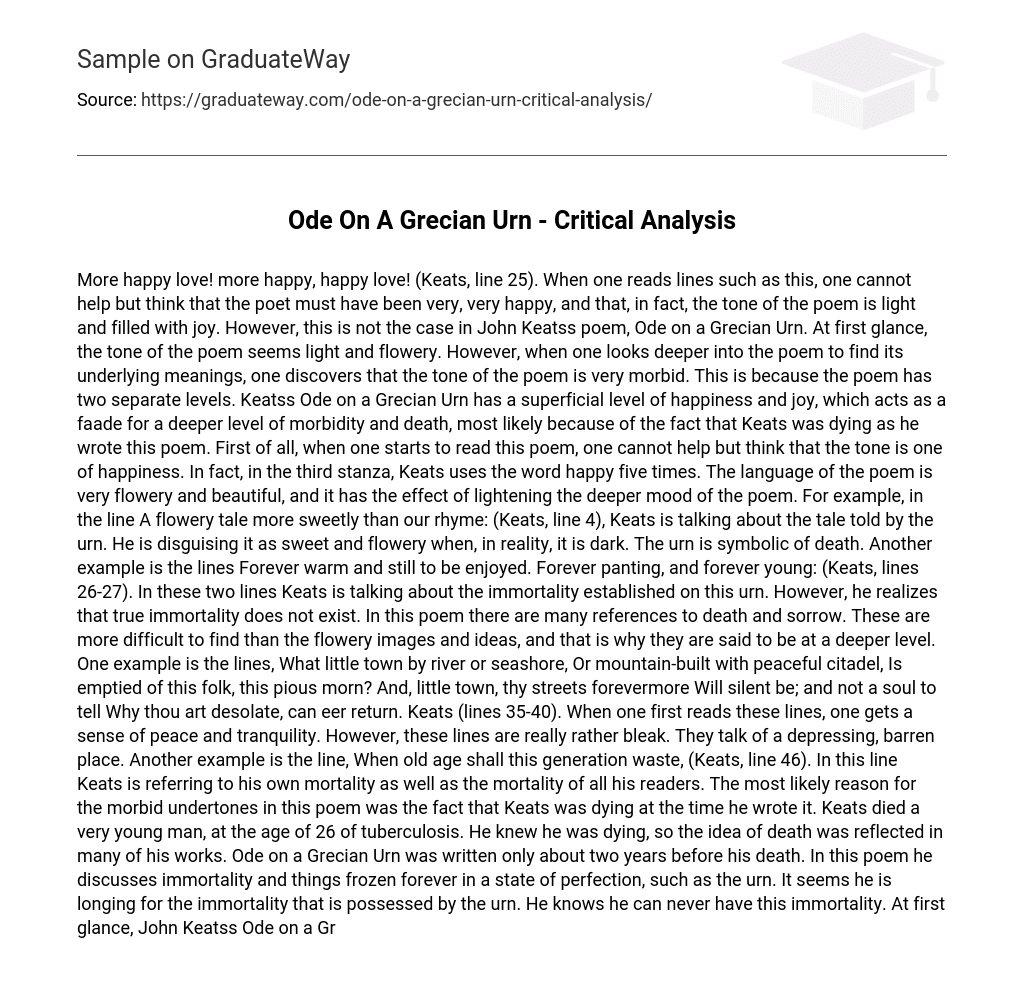The theme of love is emphasized in John Keats’ poem “Ode on a Grecian Urn”. The poet expresses his longing for greater happiness and love, indicating his immense joy. However, upon closer examination, it becomes evident that the poem’s tone surpasses mere cheerfulness. Despite its initial light and flowery nature, the poem delves into a more profound and intricate exploration of love.
The poem Ode on a Grecian Urn by Keats is initially perceived as happy and joyful. However, further analysis reveals a morbid undertone, as the poem has two distinct levels. The surface level presents happiness and joy, masking the deeper theme of morbidity and death. This is likely influenced by Keats’ own impending death while writing the poem. Upon reading, the initial impression is one of happiness, emphasized by the word “happy” being used five times in the third stanza. The language of the poem is ornate and exquisite, which helps to alleviate the underlying somberness.
For instance, in line 4 of Keats’ poem, he discusses the tale conveyed by the urn. He describes it as sweet and flowery, although it actually has a dark tone. The urn symbolizes death. Another instance is found in lines 26-27, where Keats speaks of the eternal warmth and enjoyment offered by the urn, as well as its perpetual youthfulness. These lines demonstrate the concept of immortality depicted on the urn.
However, the speaker comes to the realization that true immortality is nonexistent. Throughout this poem, there are numerous mentions of death and sorrow. These references are more challenging to uncover than the picturesque imagery and concepts, thus they exist on a deeper level. For instance, consider the following lines: “What little town by river or seashore, Or mountain-built with peaceful citadel, Is emptied of this folk, this pious morn? And, little town, thy streets forevermore Will silent be; and not a soul to tell Why thou art desolate, can eer return.” (Keats, lines 35-40). When initially reading these lines, a sense of serenity and calmness are evoked.
However, these lines convey a somber atmosphere, describing a desolate location. Another illustration is found in the line: “When old age shall this generation waste” (Keats, line 46). Keats uses this line to discuss his own mortality and that of his audience. The poem’s morbid undertones likely stem from the fact that Keats was writing it while facing his own impending death.
Keats, who died at the age of 26 from tuberculosis, reflected on death in many of his works. Ode on a Grecian Urn, written around two years before his death, explores the concept of immortality and the frozen state of perfection found in the urn. It appears that Keats yearned for the immortality embodied by the urn.
Despite the initial impression of happiness conveyed through its flowery language and imagery, John Keats’s Ode on a Grecian Urn ultimately expresses a sense of sorrow and death. Keats employs his ornate language as a mask for the underlying meaning, motivated by his awareness of his impending death. Therefore, Keats recognizes that he can never attain such immortality depicted in the poem.
Thus, the true essence of Ode on a Grecian Urn does not convey joy, but rather presents a profound insight into mortality. The piece spans across 642 words and occupies 24 pages.





